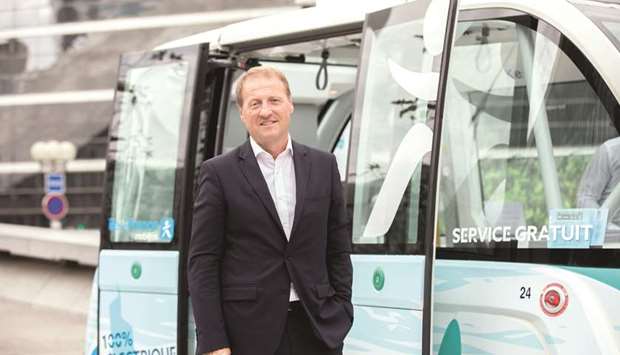“We set up in France around the same time as our rivals were starting in the US, but quickly they were raising 100 times more from investors and selling across the country,” Sapet said.
“Meanwhile we were stuck translating into 20 European languages.”
Sapet is alluding to Infogrames, the video-game maker he co-founded in 1983 when now-giant Electronic Arts Inc was just being born.
With his more recent venture — driverless car maker Navya SAS — he faces similar obstacles on financing and a fragmented European market, highlighting the issues persistently holding back France’s startups from becoming global champions.
As Paris hosts entrepreneurs at France Digitale Day today, the question of why the country can’t churn out world-dominating technology companies will loom large. A number of factors — from a scale-up mindset and culture to funding, smooth exit options, a tech-friendly stock exchange and harmonised Europe-wide regulations — will need to coalesce for Macron’s “startup nation” to not just be wishful thinking.
While much of what needs to happen is not state controlled, his team says it has plans to help entrepreneurs up their game. Many observers are sceptical.
“Is France really positioned to build, forget the next Google but even the next Spotify?” asked Peter Zemsky, dean of innovation at Insead business school. “That’s still a real challenge for them. To really build digital businesses you need to be able to scale, which is much harder in Europe than in China or the US.”
Multiple regulatory regimes and languages and inadequate capital still shackle French startups. That’s not to say the ecosystem hasn’t progressed. Macron’s predecessors had set out to cash in on the country’s strong engineering skills and history of innovation. With tax breaks and handouts by the likes of state-backed investor BpiFrance, they managed to grow venture capital while turning the spotlight to successful upstarts.
Innovative companies raised about €2bn ($2.36bn) in the first half this year in France, compared to €2.6bn over 2017, data compiled by EY show. France is catching up to the UK, the region’s leader, which had €3bn of venture capital and growth equity in the period.
Macron burnished his tech-friendly credentials in his previous job as economy minister, attending events like the Las Vegas’ Consumer Electronics Show to promote the vitality of the French startup ecosystem. Since becoming president last year, he’s gathered top executives of US tech giants like Facebook Inc’s Mark Zuckerberg in Paris, visited a mega-campus for startups in the capital and often speaks of encouraging innovation. He plans to once again touch on startups in a speech on October 9.
“The measures we have taken do take time, nothing takes effect right away,” French Digital Minister Mounir Mahjoubi said in an interview. “When we started, there were nowhere near 10,000 startups. Today, we’ve reached a level where several will be able to hit the €20mn ticket and in about a year’s time several will get to a €100mn ticket.”
The minister said by 2020 the country expects to have some companies with €150mn to €200mn in funding.
“We want France to be the most attractive country for research, innovation and new technologies in Europe,” Finance Minister Bruno Le Maire said yesterday, speaking in English to entrepreneurs. What he doesn’t want is for Europeans to flee to the US to build their companies “because we have not been able in France or the Netherlands or Germany to create exactly the same attractiveness.”
France will reduce taxes, including for people coming from overseas, Le Maire said. Also in the coming months, Macron is set to make the case to foreign investors that France will have in 2019 a big enough pool of “unicorns,” or closely held startups valued at more than $1bn, for them to invest in, according to a French official with knowledge of his plans.
But for all the cheer-leading, the country has had trouble shifting into the next gear, especially with expanding away from home. Ride-share company Blablacar’s valuation was cut by an investor this year while Sigfox, a network for connected objects, keeps pushing back a potential stock market listing.
Others like Chauffeur Prive — France’s response to Uber-YouTube wannabe Dailymotion, and Spotify rival Deezer have seen their founders exit or seek the capitalistic backing of bigger players.
Funding rounds beyond the €100mn mark are still “extremely marginal” in France, EY concluded in a report this month. Video-game maker Voodoo SAS had the only one in the first half in a deal with Goldman Sachs. There were four transactions of more than €50mn, compared with 248 deals of less than €5mn. That kind of data has earned France the reputation of spawning a “forest of bonsai trees” but no giants.
“We have a lot of startups but unfortunately not enough scale-ups,” said Jean-Baptiste Rudelle, founder of Internet ad platform Criteo SA. “The problem is fundamentally cultural — in Silicon Valley they’ve had global thinking for the past 70 years, while in France we’ve had mental barriers quite often in terms of approaching growth.”
French startups need to take leaf out of the playbooks of their Nordic peers, who’ve managed to scale successfully, with champions including Spotify and Rovio. “They’ve managed to more quickly adopt the success factors invented in Silicon Valley,” including opening ownership up to outside investors and employees quickly, Rudelle said.

